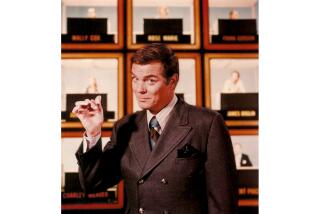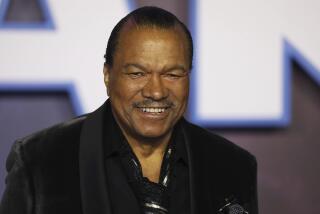In Search of . . . : William Marshall
He began his film career in 1952, playing a revolutionary Haitian planter in âLydia Bailey,â and, in a sense, William Marshall has come full circle.
While making the picture, Marshall delved into the history of Haiti, and today is developing a film project about revolutionary leader King Henry Christophe, who ruled the island country during the early 1800s.
Perhaps best known for his starring role in AIPâs low-budget âBlaculaâ (1972), which some credit as the first black horror film, Marshall has appeared in a dozen features. Since 1987, heâs been the King of Cartoons on âPee-weeâs Playhouse,â Saturday mornings on CBS.
A strong proponent of African-American heritage, heâs also been visiting local schools in connection with Black History Month, performing as Frederick Douglass, the 19th-Century slave-turned-statesman--another historical figure Marshall hopes to bring to the big screen.
Born in Indiana in 1924 and classically trained, Marshall gained renown for his portrayal of Shakespeareâs âOthello,â both on Broadway and again in England, where the London Sunday Times praised him as âthe best Othello of our time.â
The winner of two Emmys--as actor and producer--for an NBC drama in 1974, Marshall feels that performing on âPee-weeâs Playhouseâ is not a comedown, but a chance to reach a different audience--children.
âI donât do anything I donât want to do--I donât have to,â he says amiably in his deep, resonant voice, from his Pacoima home.
Working during decades when limitations for black actors were severe, Marshall refused to play demeaning roles, he says.
He even managed to bring dignity to âBlacula,â a variation of the Dracula legend, set in the early 1800s. The title character was originally a bumbling black man named Andrew Brown--the same name of the black dimwit of âAmos ân Andyâ fame. âIt was white guys again doing a stupid interpretation of what black people were supposed to be like. I told them I had no wish to be part of this exploitation.â
But the producers wanted Marshall, and the character was transformed into an African prince touring Europe--seeking an embargo against slavery.
More to Read
Only good movies
Get the Indie Focus newsletter, Mark Olsen's weekly guide to the world of cinema.
You may occasionally receive promotional content from the Los Angeles Times.










